Business Ethics Assignment: Media and Advertisement Analysis
VerifiedAdded on 2021/06/16
|7
|1207
|47
Essay
AI Summary
This essay delves into the realm of applied business ethics, specifically examining the ethical questions surrounding media advertising. The analysis focuses on the social responsibility of media and advertisements, scrutinizing the potential negative impacts of advertisements on various audiences, particularly children and teenagers. The essay explores ethical virtues such as the effects of advertisements on children, the objectification of women, and the promotion of unhealthy habits. Furthermore, it applies Kant's ethical principles to evaluate the actions of advertising agencies, considering the formula of the end itself and the concept of perfect duties. The essay concludes by assessing whether the actions of advertising agencies are morally justified and whether they align with Kant's goodwill, while also acknowledging the changing perspectives of modern society and the need for responsible advertising practices that avoid causing harm or offense.

Running head: APPLIED BUSINESS ETHICS
Applied Business Ethics
Name of the Student:
Name of the University:
Author’s Note:
Applied Business Ethics
Name of the Student:
Name of the University:
Author’s Note:
Paraphrase This Document
Need a fresh take? Get an instant paraphrase of this document with our AI Paraphraser
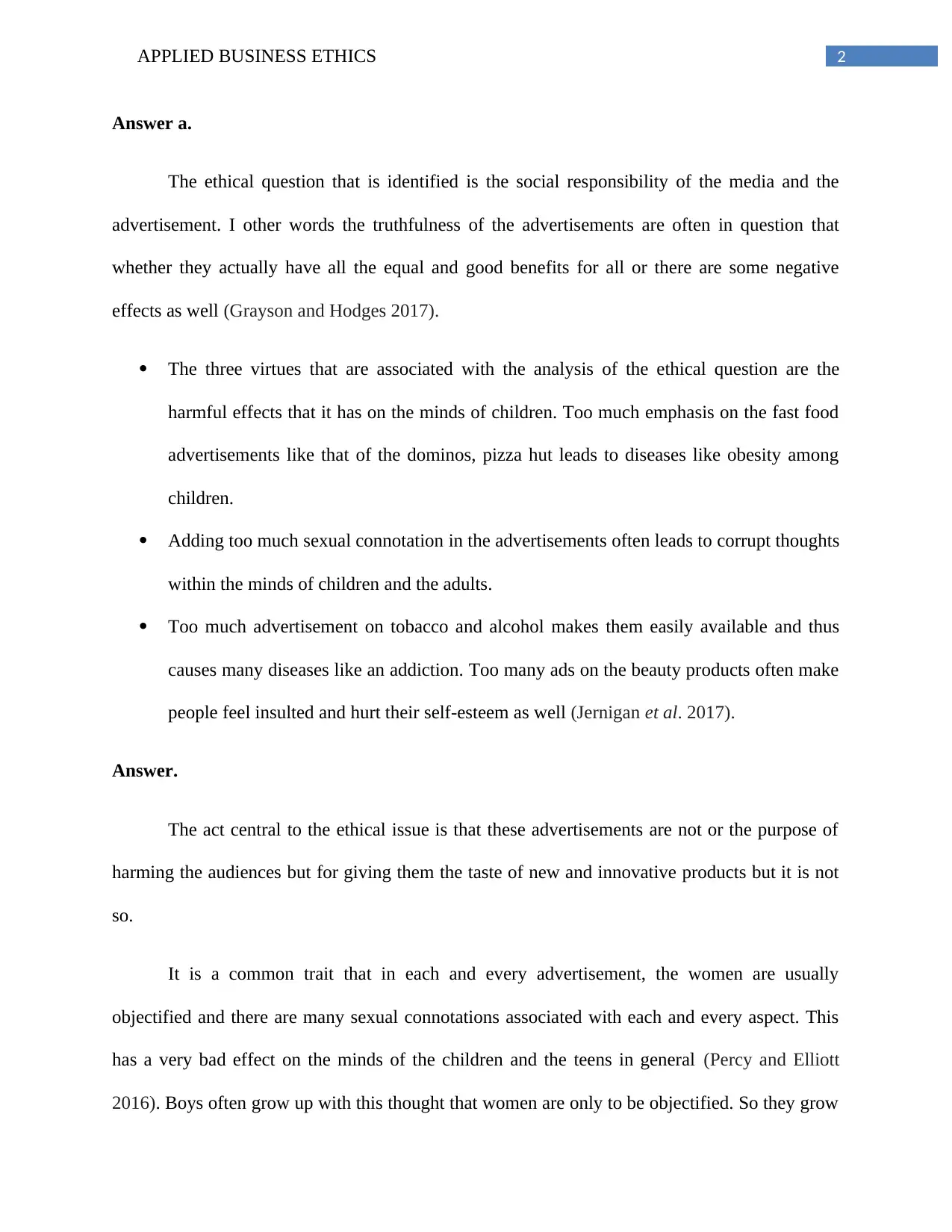
2APPLIED BUSINESS ETHICS
Answer a.
The ethical question that is identified is the social responsibility of the media and the
advertisement. I other words the truthfulness of the advertisements are often in question that
whether they actually have all the equal and good benefits for all or there are some negative
effects as well (Grayson and Hodges 2017).
The three virtues that are associated with the analysis of the ethical question are the
harmful effects that it has on the minds of children. Too much emphasis on the fast food
advertisements like that of the dominos, pizza hut leads to diseases like obesity among
children.
Adding too much sexual connotation in the advertisements often leads to corrupt thoughts
within the minds of children and the adults.
Too much advertisement on tobacco and alcohol makes them easily available and thus
causes many diseases like an addiction. Too many ads on the beauty products often make
people feel insulted and hurt their self-esteem as well (Jernigan et al. 2017).
Answer.
The act central to the ethical issue is that these advertisements are not or the purpose of
harming the audiences but for giving them the taste of new and innovative products but it is not
so.
It is a common trait that in each and every advertisement, the women are usually
objectified and there are many sexual connotations associated with each and every aspect. This
has a very bad effect on the minds of the children and the teens in general (Percy and Elliott
2016). Boys often grow up with this thought that women are only to be objectified. So they grow
Answer a.
The ethical question that is identified is the social responsibility of the media and the
advertisement. I other words the truthfulness of the advertisements are often in question that
whether they actually have all the equal and good benefits for all or there are some negative
effects as well (Grayson and Hodges 2017).
The three virtues that are associated with the analysis of the ethical question are the
harmful effects that it has on the minds of children. Too much emphasis on the fast food
advertisements like that of the dominos, pizza hut leads to diseases like obesity among
children.
Adding too much sexual connotation in the advertisements often leads to corrupt thoughts
within the minds of children and the adults.
Too much advertisement on tobacco and alcohol makes them easily available and thus
causes many diseases like an addiction. Too many ads on the beauty products often make
people feel insulted and hurt their self-esteem as well (Jernigan et al. 2017).
Answer.
The act central to the ethical issue is that these advertisements are not or the purpose of
harming the audiences but for giving them the taste of new and innovative products but it is not
so.
It is a common trait that in each and every advertisement, the women are usually
objectified and there are many sexual connotations associated with each and every aspect. This
has a very bad effect on the minds of the children and the teens in general (Percy and Elliott
2016). Boys often grow up with this thought that women are only to be objectified. So they grow
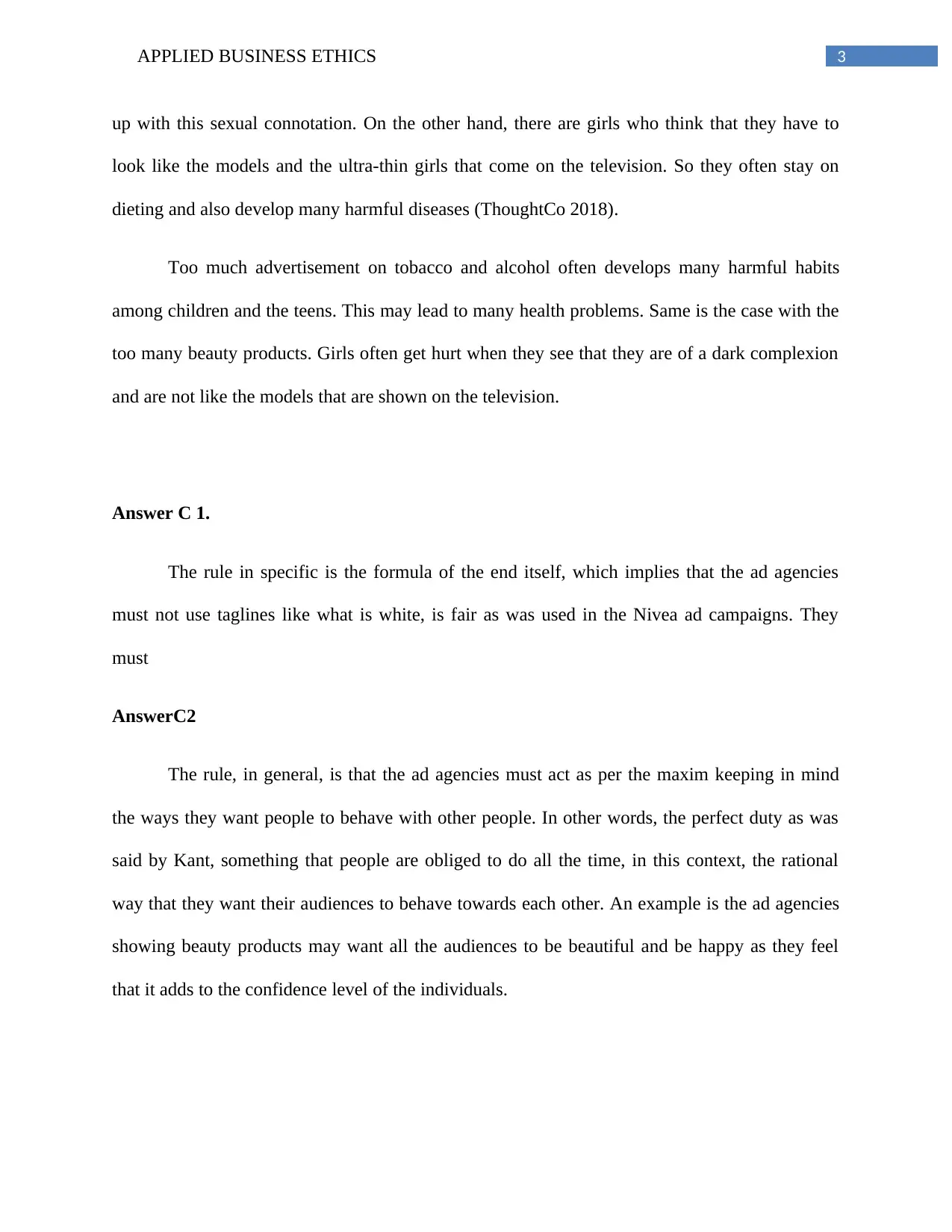
3APPLIED BUSINESS ETHICS
up with this sexual connotation. On the other hand, there are girls who think that they have to
look like the models and the ultra-thin girls that come on the television. So they often stay on
dieting and also develop many harmful diseases (ThoughtCo 2018).
Too much advertisement on tobacco and alcohol often develops many harmful habits
among children and the teens. This may lead to many health problems. Same is the case with the
too many beauty products. Girls often get hurt when they see that they are of a dark complexion
and are not like the models that are shown on the television.
Answer C 1.
The rule in specific is the formula of the end itself, which implies that the ad agencies
must not use taglines like what is white, is fair as was used in the Nivea ad campaigns. They
must
AnswerC2
The rule, in general, is that the ad agencies must act as per the maxim keeping in mind
the ways they want people to behave with other people. In other words, the perfect duty as was
said by Kant, something that people are obliged to do all the time, in this context, the rational
way that they want their audiences to behave towards each other. An example is the ad agencies
showing beauty products may want all the audiences to be beautiful and be happy as they feel
that it adds to the confidence level of the individuals.
up with this sexual connotation. On the other hand, there are girls who think that they have to
look like the models and the ultra-thin girls that come on the television. So they often stay on
dieting and also develop many harmful diseases (ThoughtCo 2018).
Too much advertisement on tobacco and alcohol often develops many harmful habits
among children and the teens. This may lead to many health problems. Same is the case with the
too many beauty products. Girls often get hurt when they see that they are of a dark complexion
and are not like the models that are shown on the television.
Answer C 1.
The rule in specific is the formula of the end itself, which implies that the ad agencies
must not use taglines like what is white, is fair as was used in the Nivea ad campaigns. They
must
AnswerC2
The rule, in general, is that the ad agencies must act as per the maxim keeping in mind
the ways they want people to behave with other people. In other words, the perfect duty as was
said by Kant, something that people are obliged to do all the time, in this context, the rational
way that they want their audiences to behave towards each other. An example is the ad agencies
showing beauty products may want all the audiences to be beautiful and be happy as they feel
that it adds to the confidence level of the individuals.
⊘ This is a preview!⊘
Do you want full access?
Subscribe today to unlock all pages.

Trusted by 1+ million students worldwide
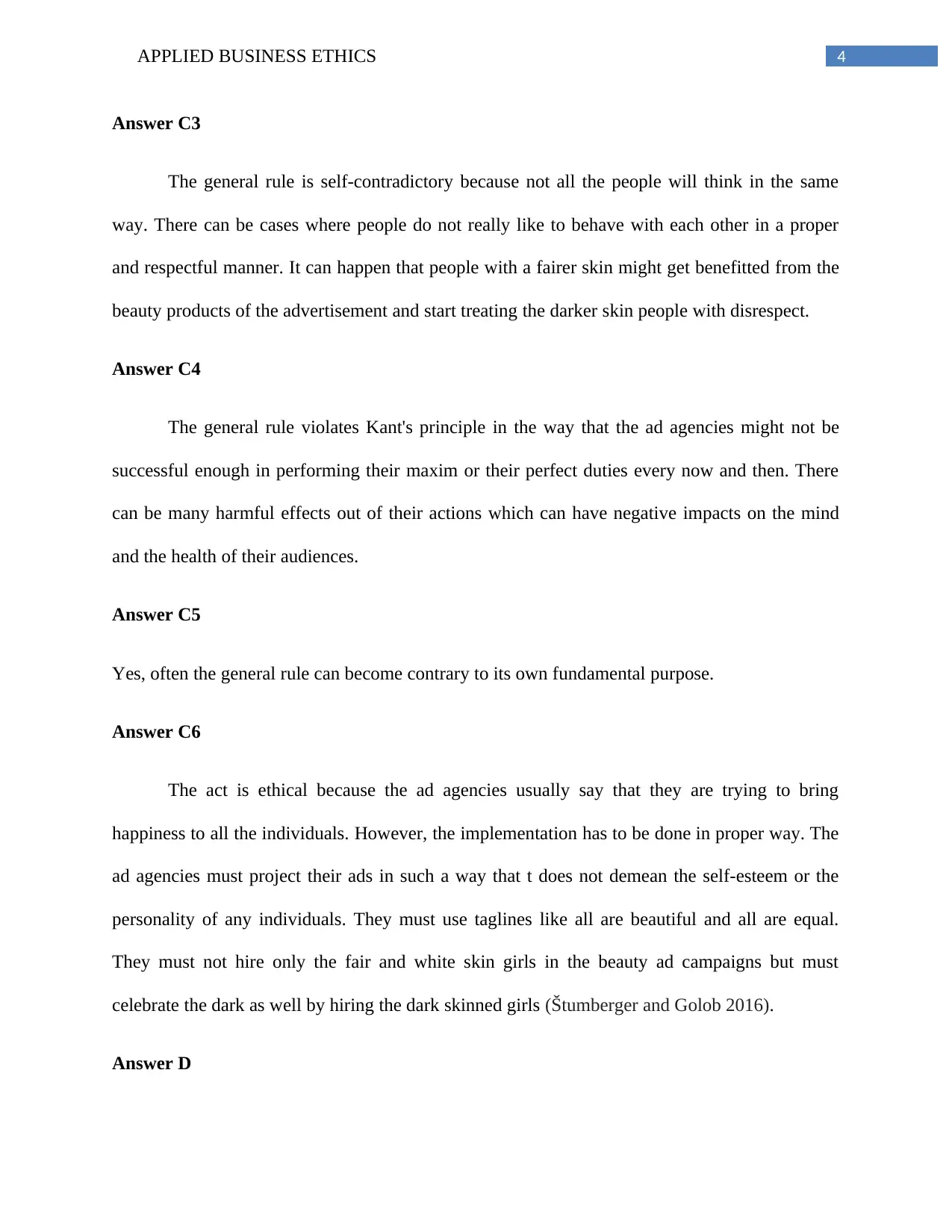
4APPLIED BUSINESS ETHICS
Answer C3
The general rule is self-contradictory because not all the people will think in the same
way. There can be cases where people do not really like to behave with each other in a proper
and respectful manner. It can happen that people with a fairer skin might get benefitted from the
beauty products of the advertisement and start treating the darker skin people with disrespect.
Answer C4
The general rule violates Kant's principle in the way that the ad agencies might not be
successful enough in performing their maxim or their perfect duties every now and then. There
can be many harmful effects out of their actions which can have negative impacts on the mind
and the health of their audiences.
Answer C5
Yes, often the general rule can become contrary to its own fundamental purpose.
Answer C6
The act is ethical because the ad agencies usually say that they are trying to bring
happiness to all the individuals. However, the implementation has to be done in proper way. The
ad agencies must project their ads in such a way that t does not demean the self-esteem or the
personality of any individuals. They must use taglines like all are beautiful and all are equal.
They must not hire only the fair and white skin girls in the beauty ad campaigns but must
celebrate the dark as well by hiring the dark skinned girls (Štumberger and Golob 2016).
Answer D
Answer C3
The general rule is self-contradictory because not all the people will think in the same
way. There can be cases where people do not really like to behave with each other in a proper
and respectful manner. It can happen that people with a fairer skin might get benefitted from the
beauty products of the advertisement and start treating the darker skin people with disrespect.
Answer C4
The general rule violates Kant's principle in the way that the ad agencies might not be
successful enough in performing their maxim or their perfect duties every now and then. There
can be many harmful effects out of their actions which can have negative impacts on the mind
and the health of their audiences.
Answer C5
Yes, often the general rule can become contrary to its own fundamental purpose.
Answer C6
The act is ethical because the ad agencies usually say that they are trying to bring
happiness to all the individuals. However, the implementation has to be done in proper way. The
ad agencies must project their ads in such a way that t does not demean the self-esteem or the
personality of any individuals. They must use taglines like all are beautiful and all are equal.
They must not hire only the fair and white skin girls in the beauty ad campaigns but must
celebrate the dark as well by hiring the dark skinned girls (Štumberger and Golob 2016).
Answer D
Paraphrase This Document
Need a fresh take? Get an instant paraphrase of this document with our AI Paraphraser
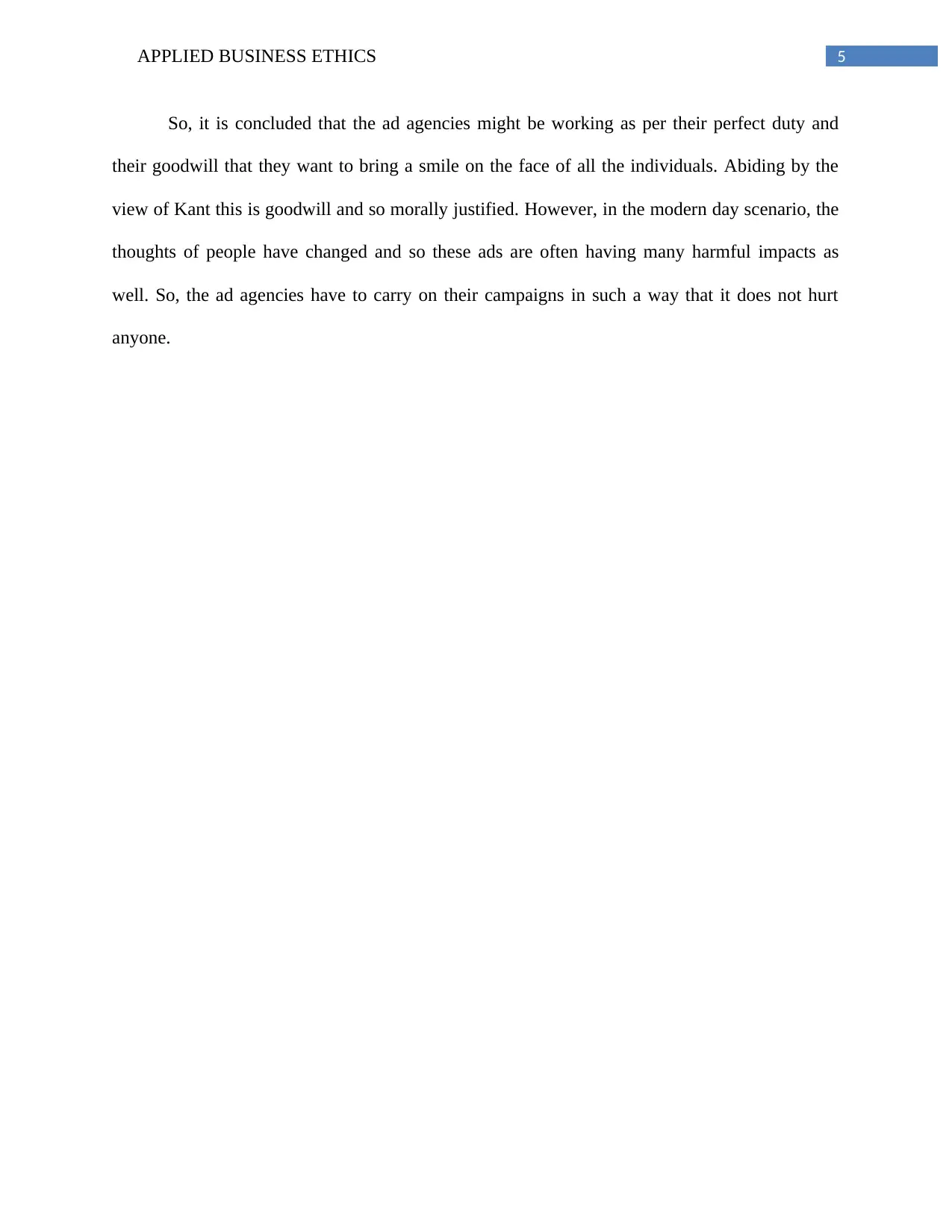
5APPLIED BUSINESS ETHICS
So, it is concluded that the ad agencies might be working as per their perfect duty and
their goodwill that they want to bring a smile on the face of all the individuals. Abiding by the
view of Kant this is goodwill and so morally justified. However, in the modern day scenario, the
thoughts of people have changed and so these ads are often having many harmful impacts as
well. So, the ad agencies have to carry on their campaigns in such a way that it does not hurt
anyone.
So, it is concluded that the ad agencies might be working as per their perfect duty and
their goodwill that they want to bring a smile on the face of all the individuals. Abiding by the
view of Kant this is goodwill and so morally justified. However, in the modern day scenario, the
thoughts of people have changed and so these ads are often having many harmful impacts as
well. So, the ad agencies have to carry on their campaigns in such a way that it does not hurt
anyone.
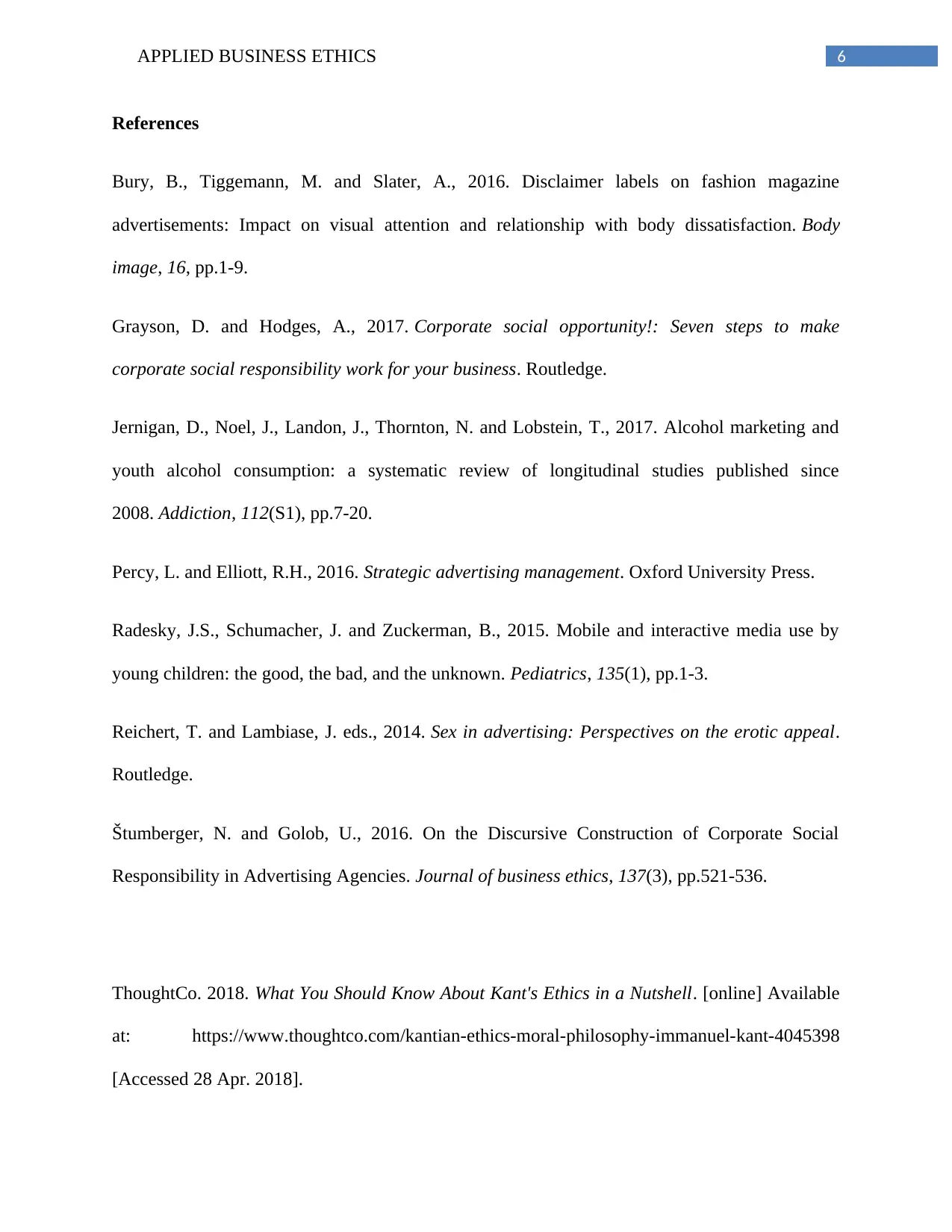
6APPLIED BUSINESS ETHICS
References
Bury, B., Tiggemann, M. and Slater, A., 2016. Disclaimer labels on fashion magazine
advertisements: Impact on visual attention and relationship with body dissatisfaction. Body
image, 16, pp.1-9.
Grayson, D. and Hodges, A., 2017. Corporate social opportunity!: Seven steps to make
corporate social responsibility work for your business. Routledge.
Jernigan, D., Noel, J., Landon, J., Thornton, N. and Lobstein, T., 2017. Alcohol marketing and
youth alcohol consumption: a systematic review of longitudinal studies published since
2008. Addiction, 112(S1), pp.7-20.
Percy, L. and Elliott, R.H., 2016. Strategic advertising management. Oxford University Press.
Radesky, J.S., Schumacher, J. and Zuckerman, B., 2015. Mobile and interactive media use by
young children: the good, the bad, and the unknown. Pediatrics, 135(1), pp.1-3.
Reichert, T. and Lambiase, J. eds., 2014. Sex in advertising: Perspectives on the erotic appeal.
Routledge.
Štumberger, N. and Golob, U., 2016. On the Discursive Construction of Corporate Social
Responsibility in Advertising Agencies. Journal of business ethics, 137(3), pp.521-536.
ThoughtCo. 2018. What You Should Know About Kant's Ethics in a Nutshell. [online] Available
at: https://www.thoughtco.com/kantian-ethics-moral-philosophy-immanuel-kant-4045398
[Accessed 28 Apr. 2018].
References
Bury, B., Tiggemann, M. and Slater, A., 2016. Disclaimer labels on fashion magazine
advertisements: Impact on visual attention and relationship with body dissatisfaction. Body
image, 16, pp.1-9.
Grayson, D. and Hodges, A., 2017. Corporate social opportunity!: Seven steps to make
corporate social responsibility work for your business. Routledge.
Jernigan, D., Noel, J., Landon, J., Thornton, N. and Lobstein, T., 2017. Alcohol marketing and
youth alcohol consumption: a systematic review of longitudinal studies published since
2008. Addiction, 112(S1), pp.7-20.
Percy, L. and Elliott, R.H., 2016. Strategic advertising management. Oxford University Press.
Radesky, J.S., Schumacher, J. and Zuckerman, B., 2015. Mobile and interactive media use by
young children: the good, the bad, and the unknown. Pediatrics, 135(1), pp.1-3.
Reichert, T. and Lambiase, J. eds., 2014. Sex in advertising: Perspectives on the erotic appeal.
Routledge.
Štumberger, N. and Golob, U., 2016. On the Discursive Construction of Corporate Social
Responsibility in Advertising Agencies. Journal of business ethics, 137(3), pp.521-536.
ThoughtCo. 2018. What You Should Know About Kant's Ethics in a Nutshell. [online] Available
at: https://www.thoughtco.com/kantian-ethics-moral-philosophy-immanuel-kant-4045398
[Accessed 28 Apr. 2018].
⊘ This is a preview!⊘
Do you want full access?
Subscribe today to unlock all pages.

Trusted by 1+ million students worldwide

7APPLIED BUSINESS ETHICS
1 out of 7
Your All-in-One AI-Powered Toolkit for Academic Success.
+13062052269
info@desklib.com
Available 24*7 on WhatsApp / Email
![[object Object]](/_next/static/media/star-bottom.7253800d.svg)
Unlock your academic potential
Copyright © 2020–2025 A2Z Services. All Rights Reserved. Developed and managed by ZUCOL.
